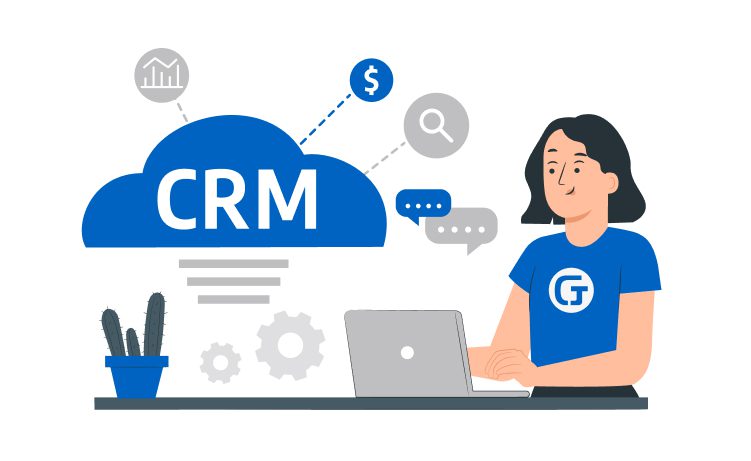
How to Build Your Own CRM Software: A Comprehensive Guide



CRM system is one of the fastest-growing software products on the market. According to the Gitnux Market Data Report of 2024, over 91% of businesses with over 11 employees now use the system. It’s essential and effective since almost all companies can use the system to close sales faster, get more leads, and manage customer information efficiently.
Simply put, a customer relationship management system captures details of transactions, stores the results of consumer interactions, and helps analyze departmental work to increase efficiency.
You might be familiar with the off-the-shelf CRM software solutions, including amoCRM, A2B, and Microsoft Dynamics CRM. Ready-made CRM platforms are practical. However, companies have actively started building their own CRM platforms.
In this article, we’ll discuss the advantages of building custom CRM software aligned with your needs and provide a detailed analysis of how to create a CRM system from scratch.
Content
Companies choose a CRM system for a variety of strategic, operational, and technological reasons. According to Market Research Future, 92% of businesses choose their own CRM software as an essential link to reach their revenue goals. Proper client relationship management can raise the revenue to 45% ROI per dollar invested.
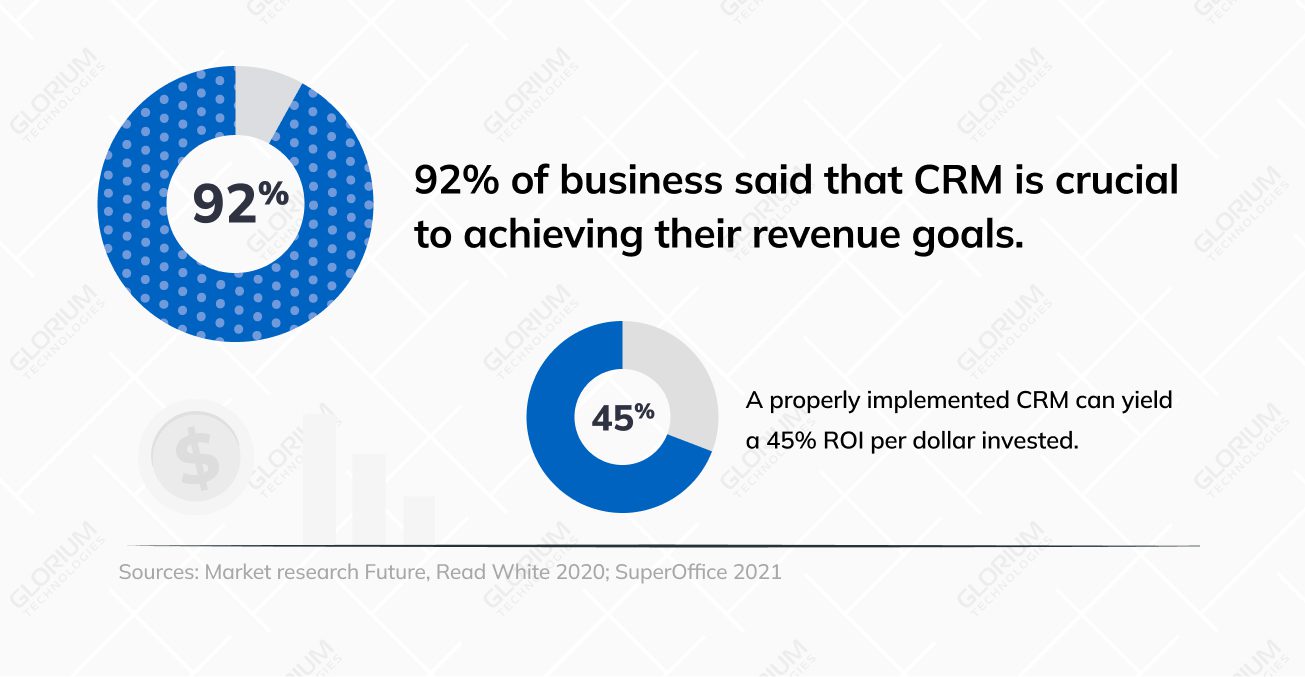
Companies turn to CRM software for centralized customer information, improved customer service, enhanced sales management, and more. Many well-known companies across various industries use CRM to enhance their operations, customer service, and sales processes.
Here are some insightful examples worth looking into:
CRM systems can be pivotal in managing your relationships with customers and suit all industries. We often see e-commerce, healthcare, IT, finance, and real estate companies using CRM software. If you’d like to learn more about custom real estate CRM software development, visit our blog.

If your business is satisfied with existing customers and you’re not planning on expanding to additional audiences, don’t worry about employing Custom CRM systems. But if you’re actively looking for new customers, driving leads, and closing deals, a CRM system can help you organize customer data and eliminate the hassle.
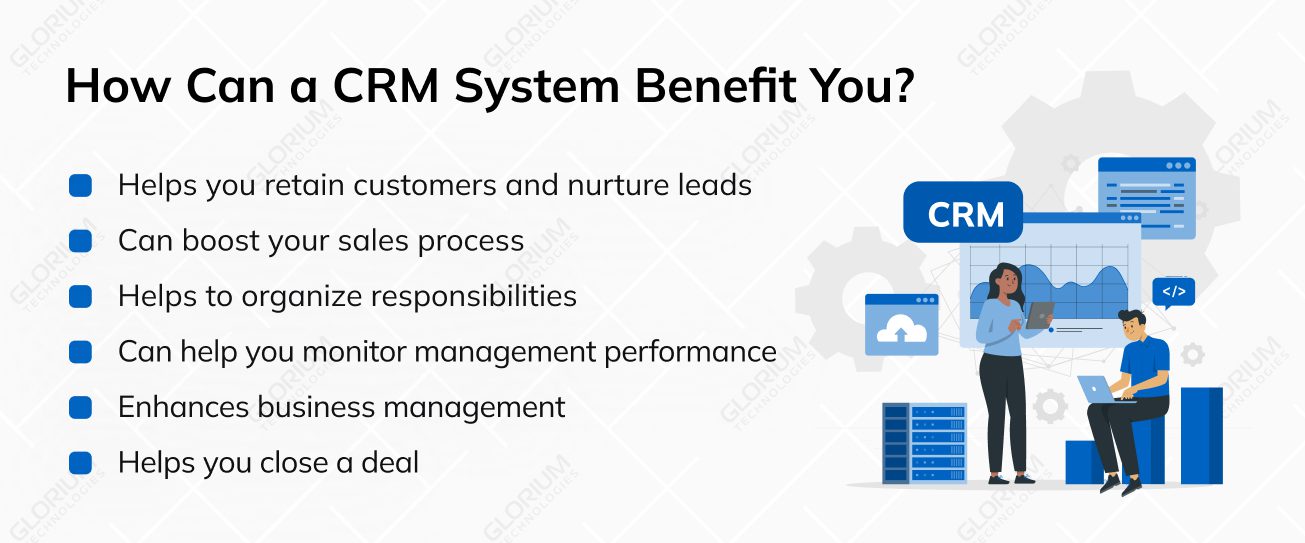
CRM software can be instrumental in retaining customers and nurturing leads by providing thorough insights and centralized data management.
It enables businesses to track client interactions, preferences, and history, allowing for personalized engagement and timely follow-ups.
Simply put, all the leads will be nurtured since the requests for quotes or calls go directly to the CRM, giving your managers a chance to access customer data and turn that information into an offer.
This personalized approach increases customer satisfaction and loyalty, thereby reducing churn. Additionally, CRMs assist in segmenting leads based on their behavior and engagement, allowing you to create targeted marketing campaigns and follow-ups that are more likely to convert leads into loyal customers.
A CRM system can significantly boost sales by streamlining and optimizing sales. By centralizing customer data, CRMs provide sales teams with detailed insights into customer behaviors and preferences. This enables personalized sales approaches and targeted marketing campaigns that increase conversion rates.
By automating the processes, CRM will give your managers more time and resources to process client requests, and you’ll have tools to analyze sales performance and implement strategic adjustments.
Some small and even large companies often lack a clear division of responsibilities for customer service teams. Such a “jack of all trades” approach to the work creates chaos, and it becomes challenging to understand who’s responsible for what.
A CRM system can be used as a central platform where tasks can be assigned and tracked, deadlines set, and progress monitored. This ensures that everyone on the team has visibility of their responsibilities and the status of collective efforts.
CRM system provides effective monitoring of managers’ performance by offering a suite of tools that track and analyze various performance metrics. You can build your own custom CRM that can be configured to record data on how managers handle customer interactions, oversee sales pipelines, and implement marketing strategies.
By centralizing customer data, sales records, and marketing social media analytics tools, a CRM provides a comprehensive overview of business activities, enabling managers to track performance metrics across different departments.
The CRM system enables closing deals by streamlining the entire sales process and providing teams with the tools to manage and nurture leads effectively. CRM can show you each lead’s pipeline stage, helping managers move it further and closer to closing the deal.
A CRM system can provide you with a massive flow of information, helpful tools, and customer data management solutions. It is recommended especially for small companies because CRM development helps reduce costs and squeeze the most out of advertising budgets.
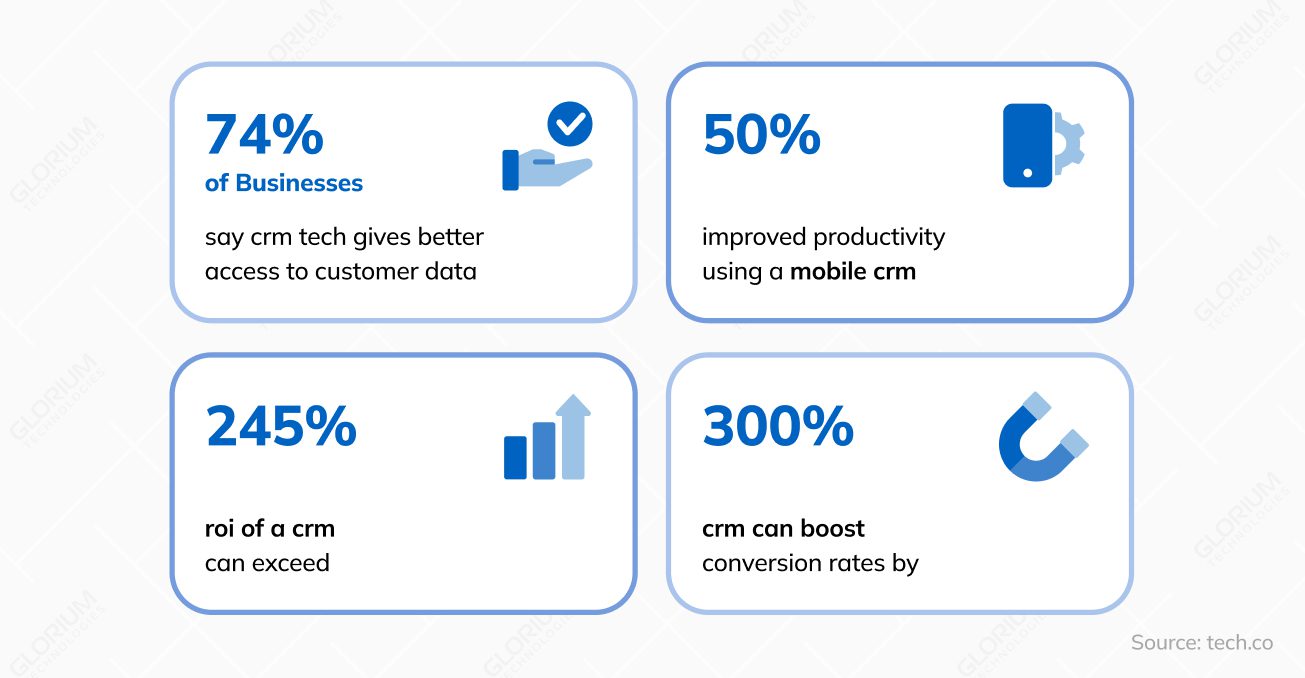
Off-the-shelf CRM system can be used by any business with standard business processes. Their advantage and main drawback are that not all companies operate under some universal strategy.
Custom CRMs consider your business’s needs and requirements. When you build a CRM, you decide which functions and features you’ll use and how they’ll work.
Off-the-shelf solutions are great for testing the waters, but what happens when you want to customize your offers or address various customers? Let’s say you have a discount for every 11th order. This could be considered a non-standard condition, and custom software is needed — you must start building your own CRM.
You draft specific CRM features, pay once for the creation, and use your software without restrictions. And, of course, custom means you can always modify your CRM system.
Let’s compare the features of tailored and pre-packaged CRM systems.
Off-the-shelf CRM systems are beneficial for their standard features, low support costs, and quick setup. Still, they come with limitations like ongoing monthly fees, additional customization costs, and training expenses. They often lack the flexibility to completely customize a company’s specific processes.
In contrast, custom CRMs are designed to align precisely with a business’s unique needs, making them ideal for companies facing growth challenges, excessive routine tasks, or detailed performance monitoring.
Interested in learning more? Read our article about the best features for a sales-boosting property CRM here.
“Turnkey solutions” have many benefits, but they come with drawbacks too. Before you decide on custom CRM development, we can examine some of the pros and cons of off-the-shelf CRM systems.
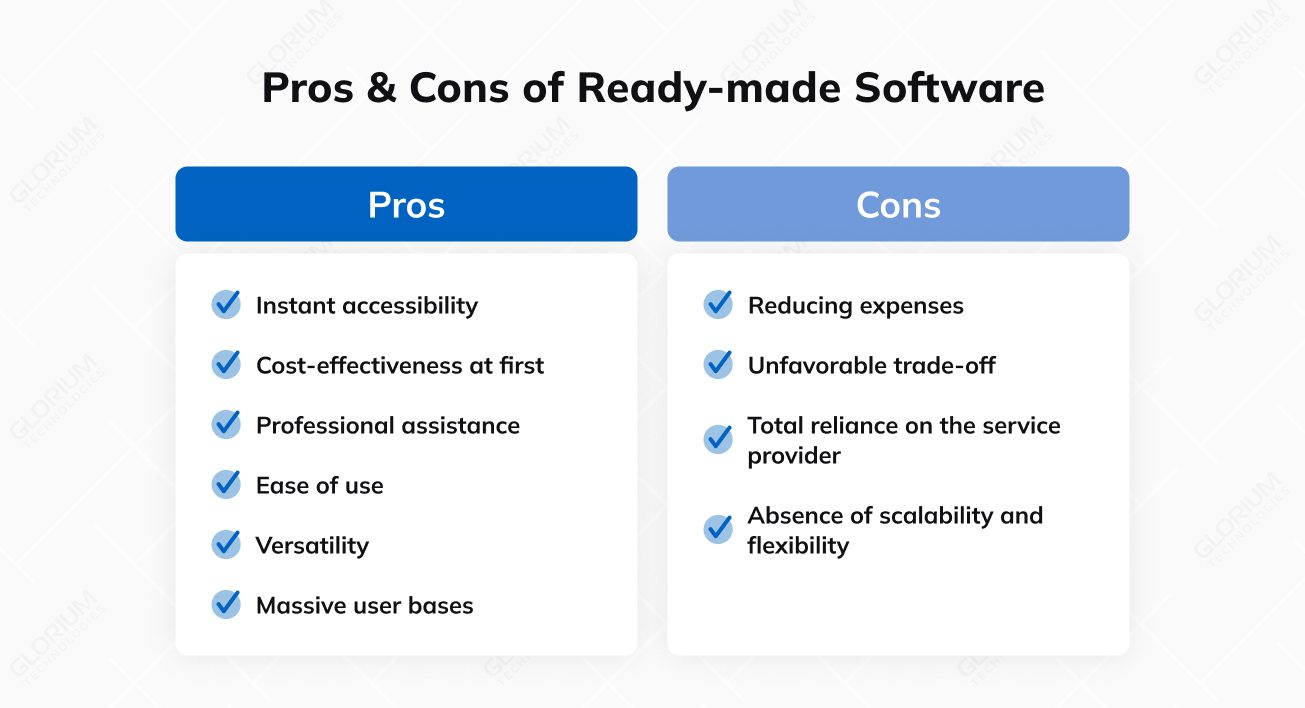
Zoho lets you fully control the company and contact management, overseeing sales processes, marketing campaigns, and the customer support module.
In addition, extensive customer data collection and processing capabilities in CRM software’s statistical reports will help improve cost recovery and develop a work plan for staff.
Drawbacks of Zoho CRM Software:
HubSpot CRM enables you to manage a database of contacts, organizations, and transactions, customize or use pre-configured fields for storing information, communicate with clients, and schedule meetings or calls directly through the platform.
This CRM system suits B2B companies. However, suppose you are a large retail business (offline stores) or a fast-growing company with many current and potential customers.
In that case, it is better to choose Custom CRM software, as Hubspot only works with 200 people.
Drawbacks of Hubspot CRM system:
Compared to the most famous analogs, Pipedrive CRM software has tangible advantages.
One of the most significant CRM features is focusing on problem-solving for small businesses or single users. In addition, system settings are as simple as they could be.
Small departments often select this CRM software to control long sales due to the simplicity of Pipedrive.
Drawbacks of Pipedrive CRM software:
While Salesforce CRM remains popular, it does have drawbacks when compared to a custom real estate CRM.
Freshsales serves as a sales force automation solution tailored for sales teams. It equips salespeople with tools to attract quality leads, engage in contextual conversations, utilize AI-powered insights to drive deals, and foster customer relationships. Additionally, it offers built-in email, phone, and chat functionalities.
Freshsales serves as a sales force automation solution tailored for sales teams. It equips salespeople with tools to attract quality leads, engage in contextual conversations, utilize AI-powered insights to drive deals, and foster customer relationships. Additionally, it offers built-in email, phone, and chat functionalities. But it also comes with some drawbacks:
So, the main drawbacks of ready-made solutions compared to custom pre-built CRM software development are as follows:
We always recommend experimenting with various solutions and trying things out. However, pre-built CRM software can drag you down and lead you to build a custom CRM system later.
To avoid these pitfalls, build a CRM system that caters to your audience’s needs and matches your requirements.
In our next chapter, you’ll learn how to build a custom CRM system from scratch, what the average CRM development cost is, and how to avoid the most common challenges of custom CRM development.
Before starting to build your own custom CRM systems, you must answer several essential questions about business processes and customer relationships to determine the scope and set of custom CRM software functions.
When selecting own CRM system for your business, consider various factors such as the specific needs of your business, its size, industry, priorities, legal requirements, user experience, and budget. Then, choose the CRM software that best fits these criteria.
A third-party CRM system is always a trade-in between business needs and the final cost.
For example, HubSpot has great integrated solutions for the sales teams over 5 people and enterprises over 100 people. Custom CRM could cover not only the size of your sales team, but also specifics of your sales funnel, or internal integrations with other software products.
Oleg KumkoProject Manager, Glorium Technologies
During the consultation and technical assignment description with the development team for CRM building, you can specify your customer interaction requirements.
For example, you can identify the primary functions of your Custom CRM, such as managing contact information, tracking customer satisfaction, task management, setting up reminders in calendars, and generating reports.
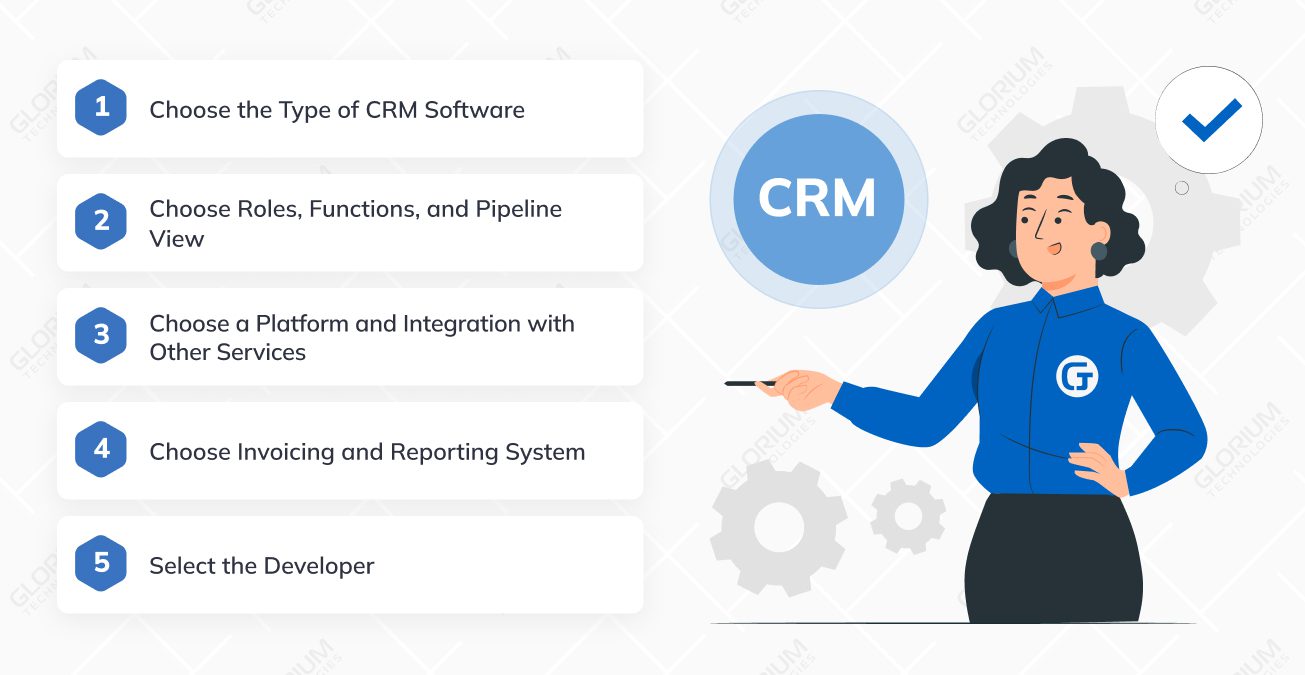
Analyzing the main features of CRM software Systems, we created a guide on how to build your own CRM system from scratch.
If you want to automate your business flows, covering all your processes in the exact way you want, it is better to build your own CRM platform system to cover your needs. All existing third-party CRM systems are built for the “common cases”; there will always be “corner cases”.
Firstly you will teach yourself to use that third party system, then you will teach others, then you will document your flows in context of third party system, this is smallest issue. But if you want to add some “custom” “business-specific” automations or flows, you will face more issues.
Andrii DavydovFull-stack developer, Glorium Technologies
When implementing a Customer Relationship Management (CRM) system, it is crucial to carefully choose the type, roles, and platforms that align with your organization’s specific needs and goals.
Careful consideration of all essential factors during CRM software development will contribute to a successful CRM implementation and improved overall customer relationship management.
These statistics by SelectHub show a fascinating insight—it turns out that bigger companies rely on their IT departments to choose the CRM vendor.
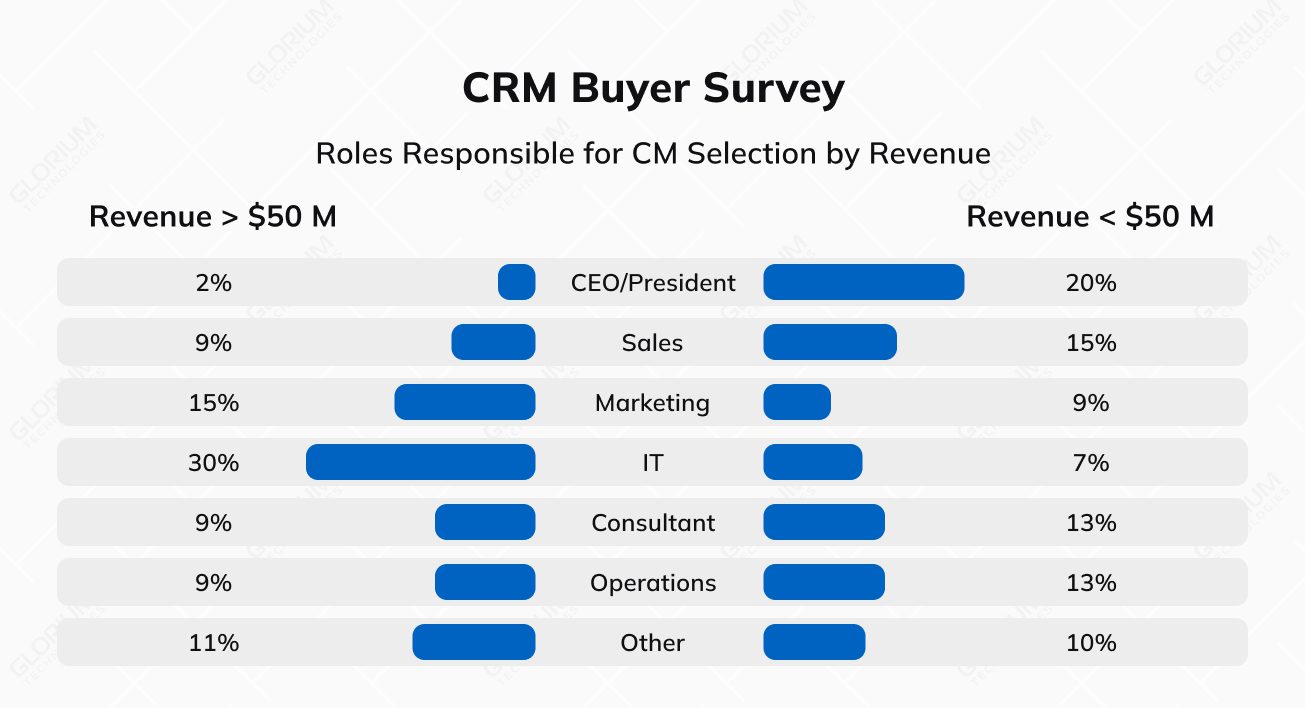
Before building a custom CRM, you need to analyze your business and choose the type of CRM software (collaborative CRM, operational CRM or analytical CRM).
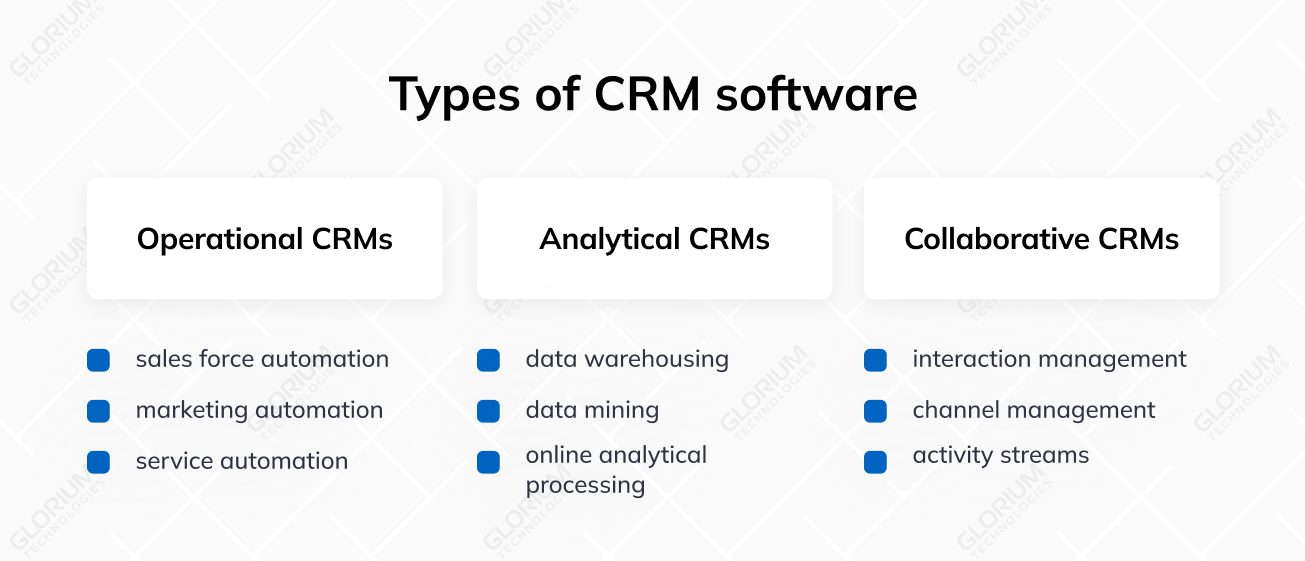
Operational CRM (optimization and automation of sales, customer service, and marketing) is a type of CRM application suitable for business, interacting with customers through call centers, blogs, websites, communities, direct mail, and direct sales.
Operational CRM standardizes the sales cycle and includes the following modules:
Analytical CRM (collecting information, including customer data, from many points of contact with the client and processing this data).
The primary function of an analytical CRM system is to facilitate the organization of daily client-related tasks and generate analytics for developing efficient strategies for client interactions.
With Analytical CRM, businesses can tailor their sales strategies to different customer segments by offering unique content and styles. It allows for individual and timely problem-solving for customers and provides more opportunities for sales, acquisition, and customer satisfaction and also customer retention, for the business.
A Collaborative CRM System combines interaction management between all departments.
Collaborative CRM allows employees to exchange information and efficiently cooperate with customers, partners, and suppliers.
The choice of CRM software system functions depends on the tasks you set for it. As a rule, the size of your business affects it the most:
When developing your own CRM system, it is essential to create several templates for typical roles (‘Owner,’ ‘Manager 1,’ ‘Manager 2,’ ‘Full Access,’ and ‘Extended Access’) and add the ability to create and customize roles.
The level of access should determine which roles users are authorized to create.
Also, building your pipeline view in the Custom CRM is crucial. The correct pipeline allows you to do the following:
As you build a CRM system, the ideal pipeline consists of five stages:
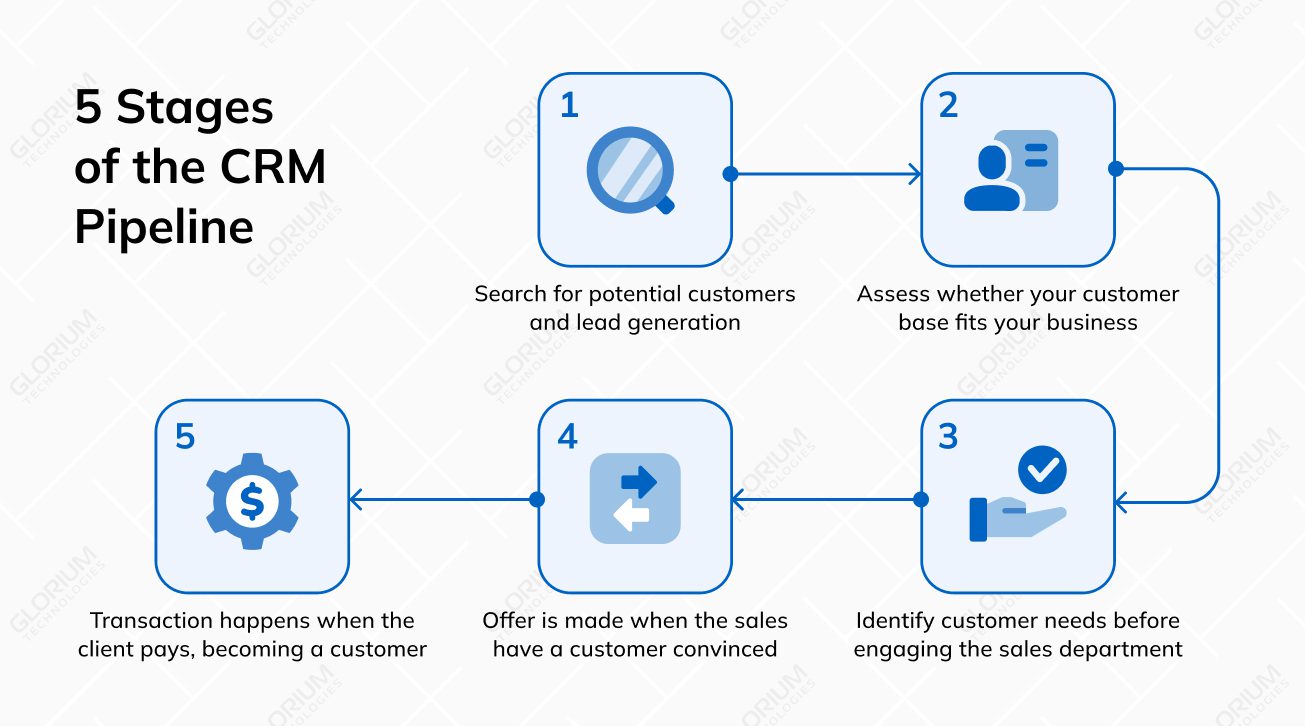
Your own CRM software allows the team to manage customer data collectively, move them quickly from one stage of the pipeline to another, increase customer retention, and monitor the team’s progress in achieving their goals.
When choosing a CRM platform for your company, consider the software equipment you already have. Internal communication will be easier if everything can be easily aligned.
Typically, web applications are compatible with Windows and macOS operating systems, although Linux can also be used.

While building your CRM, it would be best to choose how the invoicing and reporting system will be built.
Consider methods of taking information suitable for your business operations, customer invoice options, and existing customers’ invoice history.
Ensure you have the custom reports and analytics dashboard in place to track the numbers and make informed business decisions. A transparent data-sharing environment will allow all stakeholders to access this information easily.
Creating a CRM system requires a whole development team: a UI/UX designer, a front-end developer, a back-end developer, a QA engineer, and DevOps.
For this reason, we recommend hiring an outsourcing company instead of looking for freelancers. To build an efficient CRM system, you’ll need a team of professionals; hiring them individually is a hassle not worth your time. In our blog post, we discuss how to hire a remote development team.
Before we dive into the final parts of our guide, we need to discuss some advanced CRM features you can incorporate into your own CRM platform.
To build a CRM system, you must know your business needs. You might already be familiar with the necessary and basic features, but these six advanced features can improve your CRM system tenfold.
Advanced custom CRM software can employ machine learning algorithms to predict future customer behaviors, purchase patterns, and potential churn. This feature can help your business proactively adjust its strategies to meet anticipated needs and retain customers.
Take automation beyond the basics with a CRM that processes complex workflows and automates critical sales tasks, such as lead scoring, customer segmentation, and crafting personalized marketing offers. This reduces manual effort and boosts efficiency.
Build a CRM with AI-powered chatbots to provide instant customer support and enhance lead capture. These intelligent bots can manage inquiries, recommend products, and schedule appointments, elevating your customer support experience.
Build a CRM with customizable reporting and dashboard features to generate detailed reports and visualize data tailored to your specific metrics and KPIs. This not only aids in deeper analysis but also supports faster, more informed decision-making.
Secure your customer data with advanced features, including encrypted storage, multi-factor authentication, and precise access controls. Protect your business from data breaches and ensure your clients’ privacy is intact.
Ensure your CRM software integrates flawlessly with your existing business tools, such as ERP systems, email marketing platforms, and accounting solutions. This harmonization streamlines data flow across systems, optimizing overall business operations and productivity.
The cost of CRM development depends on the set of functions. Therefore, it is crucial to understand how your CRM software should manage roles, tasks, and reports.
To calculate the estimated cost of CRM creation, we focused on the time needed for the CRM development cost of software development. The average hourly price is around $50.
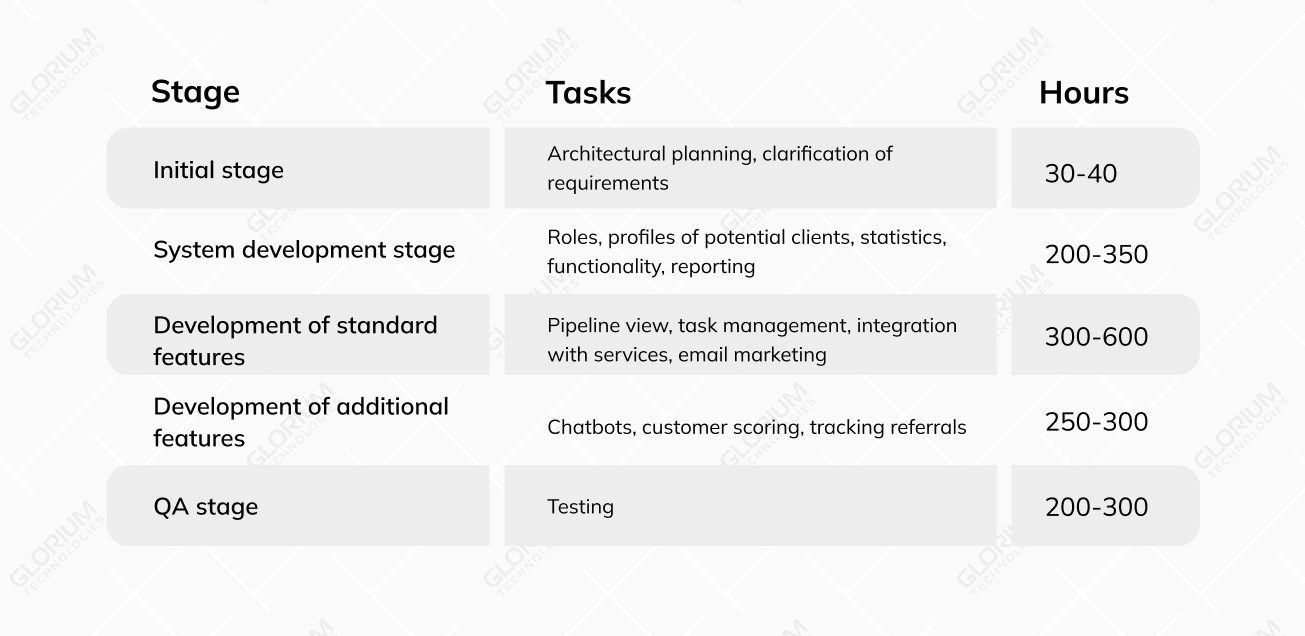
Your decisions will affect the final price of the CRM development project if you want to remove some of the mentioned features from your CRM system or add new ones.
Glorium Technologies is a software development company that addresses the unique business needs of its clients by employing the latest and most pertinent technologies.
We have 12+ years of experience helping customers in software development. Some of the most prominent projects include:
If your business is snowballing and standard solutions don’t fit your needs, we suggest creating a customized CRM system. CRM development will provide all the necessary functions for successful business development and automate many routine processes, resulting in cost reduction and increased revenue goals.
Although off-the-shelf solutions fix some issues, and many companies have benefited, a customized CRM system can do much more than a pre-made product. We recommend contacting a professional development company to build your own CRM system and start improving your workflow, growing sales, and building better relationships with customers.
Contact us and learn how to make a CRM system from scratch.
The cost of creating a custom CRM can vary widely, typically from $50,000 to over $300,000. Factors affecting the cost include the complexity of the features, the scale of the CRM system, and the geographic location of the developers.
If you decide to build your own CRM with advanced functionalities like marketing automation and custom reports, the development process can become more costly.
The time required to build a CRM software depends on its complexity and scope. A basic CRM system can be developed in a few months, but a comprehensive custom CRM software with extensive features like contact management and custom reports could take over a year.
Developing custom CRM software typically requires a combination of front-end and back-end technologies, such as JavaScript, React, or Angular for the front end and Node.js, Python, or .NET for the back end. You’ll also need databases like MySQL or MongoDB for data management.
The choice of tech stack can influence your CRM software’s flexibility, data security, and scalability.
Building CRM in-house can be beneficial if you have a skilled IT team that is familiar with custom CRM development processes. However, hiring external developers might be necessary to access specialized skills and accelerate the development process.
Typically, your sales, marketing, and customer service teams will use CRM systems. These tools help track customer behavior and automate tasks like contact management.
Core features of a CRM system include contact management, sales tracking, customer interaction logs, task management, event tracking, marketing automation, and custom reports.
These features help manage detailed customer information and track business relationships effectively.
You might need to build custom CRM software if generic CRMs do not support your specific business processes or if you require advanced features like detailed customer behavior analytics or integrated custom reports.
A custom CRM is also beneficial if you need enhanced data security or specific integrations with existing systems, such as accounting software.
Ongoing maintenance and updates for your CRM software are crucial to ensure reliability and security. Establish a plan for regular updates and choose whether to handle this in-house or through a support contract with external developers.
Consider using automated testing tools to manage updates more efficiently.
Yes, integrating your CRM software with other business tools, such as marketing platforms and accounting software, is possible and often beneficial. Integration helps create a seamless flow of information across different business functions, enhancing productivity and insight into customer behavior.

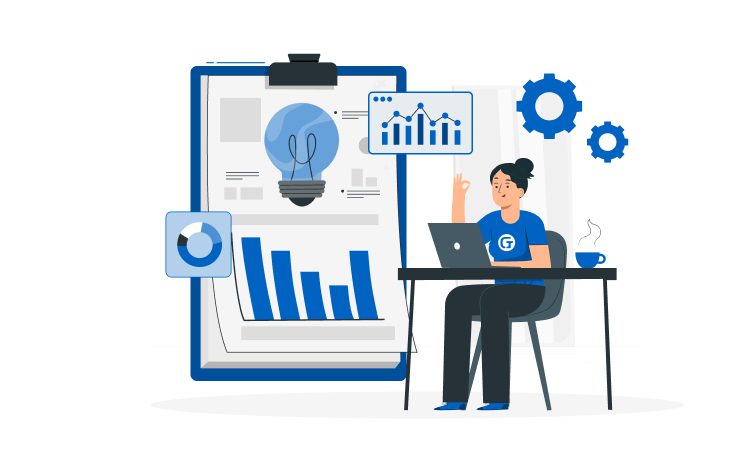


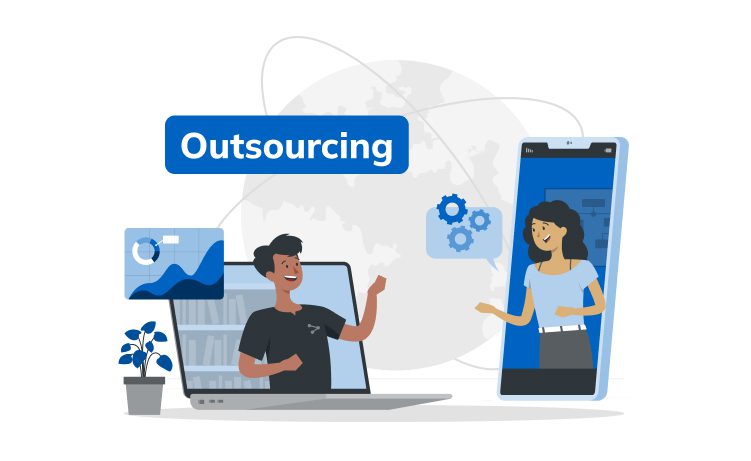


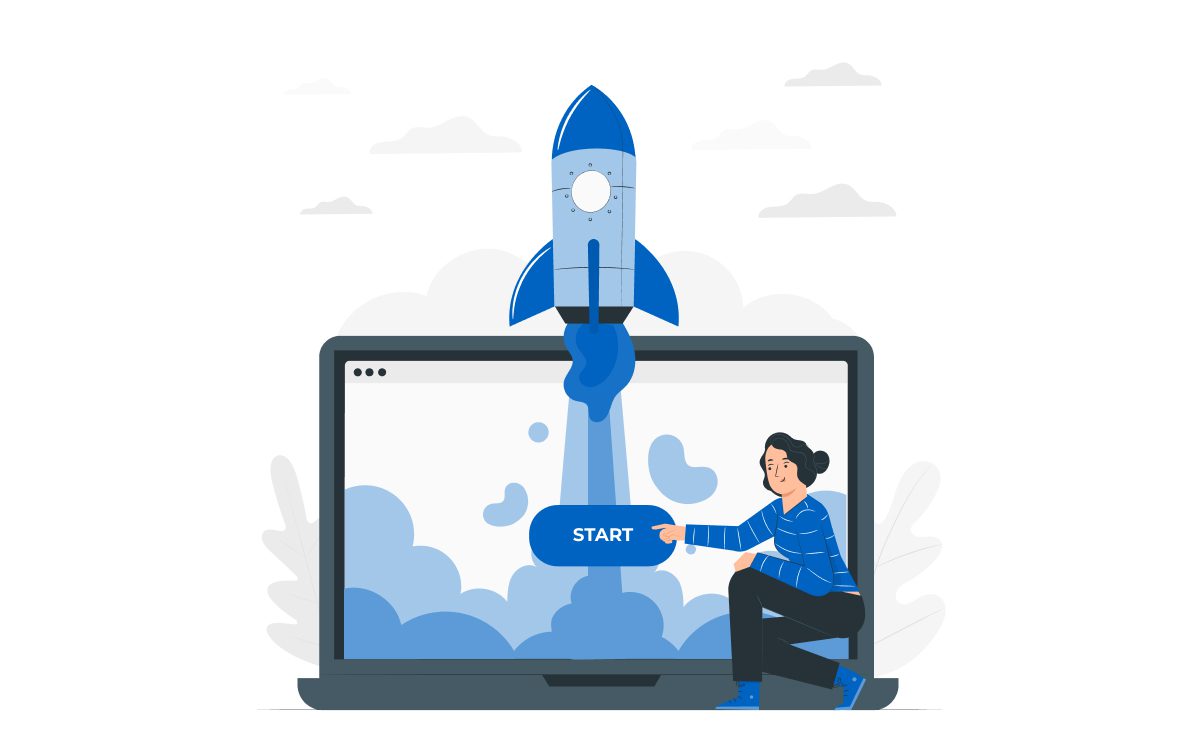

| Cookie | Duration | Description |
|---|---|---|
| cookielawinfo-checkbox-analytics | 11 months | This cookie is set by GDPR Cookie Consent plugin. The cookie is used to store the user consent for the cookies in the category "Analytics". |
| cookielawinfo-checkbox-functional | 11 months | The cookie is set by GDPR cookie consent to record the user consent for the cookies in the category "Functional". |
| cookielawinfo-checkbox-necessary | 11 months | This cookie is set by GDPR Cookie Consent plugin. The cookies is used to store the user consent for the cookies in the category "Necessary". |
| cookielawinfo-checkbox-others | 11 months | This cookie is set by GDPR Cookie Consent plugin. The cookie is used to store the user consent for the cookies in the category "Other. |
| cookielawinfo-checkbox-performance | 11 months | This cookie is set by GDPR Cookie Consent plugin. The cookie is used to store the user consent for the cookies in the category "Performance". |
| viewed_cookie_policy | 11 months | The cookie is set by the GDPR Cookie Consent plugin and is used to store whether or not user has consented to the use of cookies. It does not store any personal data. |